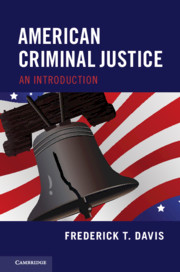Book contents
- American Criminal Justice
- American Criminal Justice
- Copyright page
- Dedication
- Contents
- Acknowledgments
- 1 Introduction
- 2 The Federal Structure; Sources of the Law
- 3 Investigation and Evidence-Gathering—The Participants
- 4 Investigation and Evidence-Gathering—Procedures
- 5 Arrest and Pretrial Detention
- 6 The Decision to Prosecute, or Not
- 7 Joinder of Charges and Defendants
- 8 Venue
- 9 Assistance of Counsel
- 10 Trial Rights and Preparation for Trial
- 11 Alternative Outcomes
- 12 Double Jeopardy
- 13 The Trial
- 14 Sentencing
- 15 Appeals
- 16 Corporate Criminal Responsibility
- 17 Internal Corporate Investigations
- 18 Professional Responsibility
- 19 Conclusion
- Bibliography
- Index
10 - Trial Rights and Preparation for Trial
Published online by Cambridge University Press: 08 June 2019
- American Criminal Justice
- American Criminal Justice
- Copyright page
- Dedication
- Contents
- Acknowledgments
- 1 Introduction
- 2 The Federal Structure; Sources of the Law
- 3 Investigation and Evidence-Gathering—The Participants
- 4 Investigation and Evidence-Gathering—Procedures
- 5 Arrest and Pretrial Detention
- 6 The Decision to Prosecute, or Not
- 7 Joinder of Charges and Defendants
- 8 Venue
- 9 Assistance of Counsel
- 10 Trial Rights and Preparation for Trial
- 11 Alternative Outcomes
- 12 Double Jeopardy
- 13 The Trial
- 14 Sentencing
- 15 Appeals
- 16 Corporate Criminal Responsibility
- 17 Internal Corporate Investigations
- 18 Professional Responsibility
- 19 Conclusion
- Bibliography
- Index
Summary
The Sixth Amendment to the Constitution provides that an “accused shall enjoy the right to a speedy and public trial ….” In federal courts, this right has been codified in the Speedy Trial Act, 18 U.S.C. § 3161–74, which requires that a trial begin within seventy days of the date of the filing of the indictment or information or of the date the defendant first appears in court, and has special provisions for a defendant in custody. The Act allows a judge to provide for longer periods only if based on a specific finding satisfying one or more permissible bases for delay listed in the Act. For example, the court may postpone trial for a period necessary to allow the parties to prepare for a complex case or while the judge is considering how to rule on motions made by the parties, or it may approve a longer period if the parties agree to an outcome such as a deferred prosecution agreement, as discussed in Chapter 11.D. However, the parties (prosecutor and defense) cannot simply agree among themselves to extend the time limits of the Act, but must persuade a judge that grounds exist to do so under one of the exceptions specifically permitted by the Act. This requirement not only protects defendants against agreements reached by prosecutors and defense attorneys to satisfy their own personal schedules, but also reflects the public’s interest in a prompt trial.
- Type
- Chapter
- Information
- American Criminal JusticeAn Introduction, pp. 57 - 63Publisher: Cambridge University PressPrint publication year: 2019



